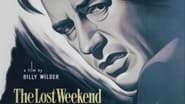RyothChatty
ridiculous rating
Btexxamar
I like Black Panther, but I didn't like this movie.
Tayloriona
Although I seem to have had higher expectations than I thought, the movie is super entertaining.
Kirandeep Yoder
The joyful confection is coated in a sparkly gloss, bright enough to gleam from the darkest, most cynical corners.
jadavix
In "The Lost Weekend", Ray Milland gave what may have been the screen's first ever serious portrayal of an alcoholic. The dipsomaniac was a stock character of comedy theatre long before films were invented, but Milland's Don Birnam bears no relation to the characters famously played by W.C. Fields.Birnam is a struggling New York writer who gets by with the support of his brother, Wick, and his saintly girlfriend, Helen. These two intend to take Birnam on a weekend vacation that will extend a period of sobriety, however Birnam heads to a bar where he gets drunk and loses track of time, missing the trip. He thereafter heads on a massive bender.There are a series of harrowing scenes that follow, such as the heart-wrenching moment where Birnam is caught trying to steal to pay his bill in a restaurant, and his experience of Delirium Tremens. There is also a sadistic nurse in the real-life Bellvue Hospital where Birnam briefly stays; this was the first movie that the Hospital allowed to be filmed there.The movie has, it must be said, a commendable realism, as does Milland's powerful central performance. The movie even hints at the even more bleak possibility of suicide; however, the ending seems to take a step back from truth, with a happy ending I could have done without.
SnoopyStyle
Alcoholic Don Birnam is a failing writer who is suppose to be in recovery. He's packing for the weekend but he's also hiding his booze from his brother Wick and girlfriend Helen. They find his hidden whiskey. Wick has enough and Helen is desperate to cure his sickness. Don goes on a bender as he cannot avoid the lure of the drink.This is shocking realism back in day from iconic director Billy Wilder. For me, this is too overwrought. It feels fake with melodramatic overacting. Some of what the actors are doing are almost comical in terms of a modern film. I'm sure this was groundbreaking back in the day but this is more like an excessive movie of the week. I understand it's asking too much for an old movie to be throughly modern. I just find it tough to stay interested in this story.
CinemaClown
Winner of 4 Academy Awards including Best Picture, Billy Wilder's follow-up to his mighty successful Double Indemnity is a deeply unsettling yet painstakingly realistic illustration of alcoholism that takes the subject of alcohol dependency far more seriously than any other Hollywood film before it & is absolutely uncompromising with its content.Based on the novel of the same name, The Lost Weekend tells the story a chronic alcoholic over a four day period which begins with him evading the country weekend planned by his brother & girlfriend and covers his desperate attempts to get himself a drink while flashback reveals the past events of his life, most of which went wrong because of his drinking habits.Co-written & directed by Billy Wilder, The Lost Weekend shows that there is nothing funny about an alcoholic or any sort of addiction for that matter. The film also hits the mark when it comes to depicting the inner struggle & helplessness one feels when attempting to resist a strong urge for what the person is dependent on, and the desperation that follows when it isn't around.The events of the picture are nicely photographed in black-n-white, the pacing is controlled for the most part, background score is wonderfully composed, humour infused in the story is pitch-black and Ray Milland delivers a truly magnificent performance as our protagonist for he sells his character in an extremely convincing manner & his depiction of an addict is highly relatable.On an overall scale, The Lost Weekend is another fabulous piece of filmmaking from Billy Wilder that paints a devastating portrait of addiction, is technically sound in all aspects & benefits greatly from Milland's terrific on-screen work. Entertaining, enlightening & alarming, The Lost Weekend is an essential cinema that deserves a watch or two from every film lover out there.
Ross622
For alcoholics there is a lot of lessons to be learned in the film that earned Billy Wilder his first academy award for best director The Lost Weekend. Though not really a film that deserved to win best picture this movie knows a lot about alcoholism and how addicting it could be when people didn't know the effects at the time of it's release. The movie stars Ray Milland as Don Birnam an alcoholic writer who binges on alcohol for exactly 3 days straight, (as well as deserving his Oscar for proving the bad effects.). Though not a great film it also tells us how crazy a drunkard can really be. It's Milland who gives a better performance than anyone else in this film but the Jane Wyman performance is a little tiny problem with it, which that was in the ending scene when Birnam wants to kill himself but Wyman's character does one good thing and that is persuade him not to kill himself but the biggest mistake is that SHE TRIES TO MAKE HIS ALCOHOL ADDICTION A LOT WORSE THAN IT WAS BEFORE. Wilder does a decent job with directing this film, but one thing just leaves me with one question, Why did this film get so much Oscars including best picture that it didn't deserve?









